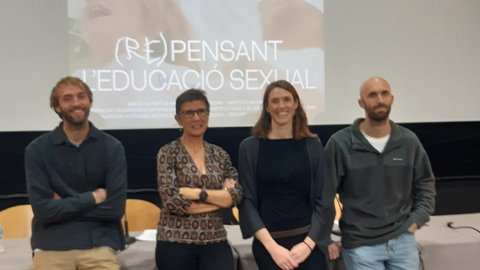The UAB to offer a preview of the documentary "(Re)pensant l'educació sexual", based on the SexAFIN project on sexuality and childhood
Before airing on TV3 on 21 November, the UAB Cinema Hall invites the university community to a preview of the documentary (Re)pensant l'educació sexual [(Re)thinking sex education] on Wednesday 15 November at 5:30 p.m. This documentary aims to share some of the results of the project SexAFIN: sexualitats i infàncies, conducted by the UAB's AFIN Group and based on the PhD thesis of Estel Malgosa, social anthropology researcher at the UAB. The documentary shows children of three primary education schools throughout different years with the aim of helping society rethink the type of sexual education given to children. The documentary's trailer can be viewed here.

Estel Malgosa: "The documentary portrays a social problem: the difficulty of adults to talk about sexuality with children".
The UAB Cinema Hall will host on Tuesday 15 November the preview - before the premiere and broadcast on Tuesday, 21 November on TV3's programme Sense Ficció - of the documentary (Re)pensant l'educació sexual, based on an ethnographic research of the UAB and produced by La Rectoria, with the collaboration of TV3, ICEC and the Women's Institute.
This documentary is based on the project SexAFIN: sexualitats i infàncies that the AFIN research group of the UAB carried out from 2017 to 2023, and included the PhD thesis of UAB's social and cultural anthropology researcher Estel Malgosa, director of the audiovisual.
Malgosa explains that the documentary film portrays "a problem centered in Catalan society: the difficulty of adults to talk about sexuality with children". According to the anthropologist, "this difficulty is based on social and historical processes. On the one hand, in the way in which our society has constructed sexuality as something adult and closely linked to sexual practices -sex-, and on the other hand, how society understands childhood: innocent and asexual beings that we have to 'protect' from sexual knowledge".
May the children's voices help adults rethink
The creation of this documentary, which began in early 2022, aims to reach out to as many people as possible and share the main results of the research, so that "the voice of children can help adults to rethink and reflect on what kind of sexual education we want to offer to create a world with healthy, pleasurable, safe, respectful and equitable sexualities," explains the director of the documentary.
Participating in the documentary were children from the fourth, fifth and sixth grades (9 to 11 year olds) from the schools Àgora in Barcelona, Pau Casals in Sant Llorenç d’Hortons and Les Fonts in Gelida.
Throughout the documentary, the children's views are complemented by those of professionals from various fields such as education, gynaecology, sexology, erotic film production, anthropology, and research and psychology. "The adult views are not intended to take over the protagonism of the children, but to contextualize the phenomena explained by these boys and girls. For example, to make explicit the difficulties of the teachers in the implementation of sexual education", details researcher Estel Malgosa.
The interest of children in being able to understand their bodies, feelings and desires, and the lack of information, pushes them to look for other sources of information, such as peers, the internet and pornography, the documentary asserts.
Two types of inequality
According to Estel Malgosa, "the critique of the documentary points out two types of inequality that children in Catalan schools experience regarding sexual education: age and gender". She explains that children have the right to have the necessary information to make healthy decisions about their sexuality. However, because they are "little" people, this information is not given to them, which makes it difficult for them to have good sexual and reproductive health and places them in a situation of greater vulnerability to sexual aggression, harassment or abuse (the current figures for the latter correspond to 1 in every 5 children).
Gender inequalities are another avenue of oppression narrated in the documentary. Despite all the progress that has been made in equality and coeducation, sexuality is an area where great imbalances of power develop. Therefore, if we want to educate in equality for men and women, we must educate in sexuality.
"For example, families and teachers tend to talk about reproduction to talk about sexuality, which draws sexuality as something adult, heterosexual, focused on genitals and vaginal intercourse, which emphasizes male pleasure (necessary for reproduction) and invisibilizes female pleasure, linking sexuality symbolically to pain (through menstruation)", says the researcher of the UAB's AFIN group.
At the same time, the documentary highlights a greater difficulty for girls to be able to talk about sexuality, as well as the lack of knowledge about their bodies and genitals, while it also gives visibility to the pressure boys feel in having to demonstrate their masculinity.
The documentary adopts "a child-centered perspective and aims to vindicate sexual education so that children can have healthy and pleasurable sexualities, and not only to continue 'protecting' them from risks, nowadays related to sexual and gender violence".
L'assistència a la projecció de la cinta audiovisual és oberta a tothom. Només cal inscriure-s’hi prèviament mitjançant el formulari següent.
Attendance to the screening of the documentary is open to everyone, but htose interested must register beforehand by filling out this form.
El documental s'estrenarà i emetrà al programa Sense Ficció de TV3 el dimarts 21 de novembre, al vespre.
The documentary will be premiered and broadcasted on TV3's programme Sense ficció on the evening of 21 November.
ARTICLE: Sexualitat i infància a Catalunya, Espanya: significacions governades. Revista Periferia, on Anthropology research, 2022: periferia_a2022v27n2p4.pdf (uab.cat)